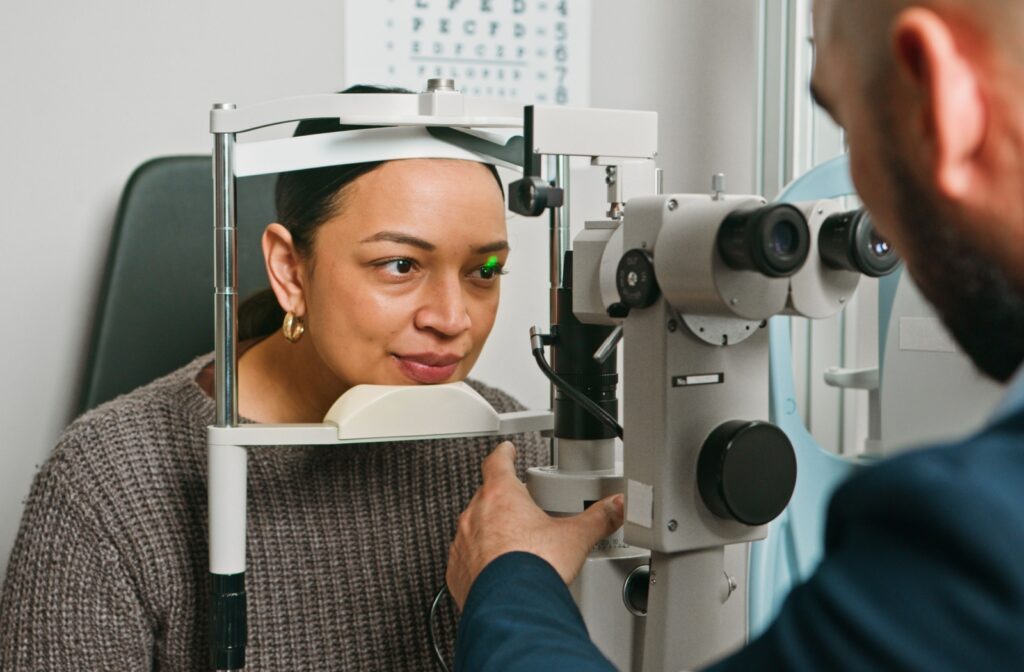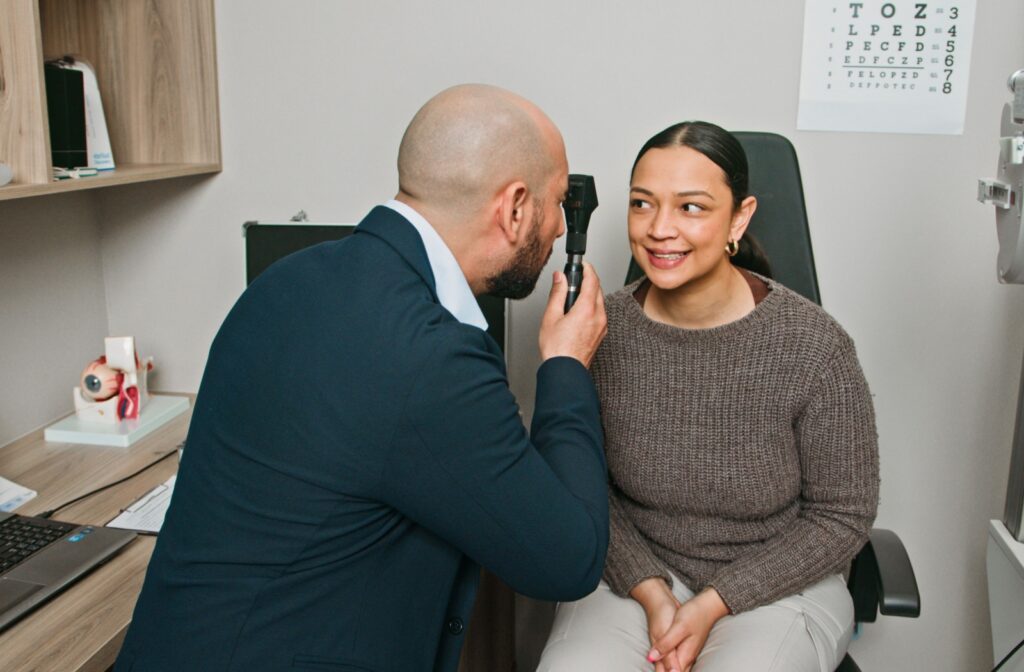Routine eye exams are essential not only for maintaining clear vision but also for preserving your overall health. Most people should schedule an eye exam every 1 to 2 years, but your individual needs may differ based on your age, overall health, and any existing vision concerns.
Eye exams can detect early signs of eye conditions and systemic health issues. Scheduling regular check-ups ensures your prescription is up to date and your eyes are functioning as they should. Knowing how often you should get your eyes checked is the first step to protecting your long-term vision.
How Often Should You See Your Eye Doctor?
The frequency of eye exams varies depending on your age, lifestyle, and any underlying health conditions.
Children & Teens
Children should have their first comprehensive eye exam at 6 to 12 months old, followed by another around age 3, and again before starting school. After that, annual eye exams are recommended to monitor vision development and catch any issues early.
Regular eye exams in children can detect conditions like lazy eye (amblyopia), crossed eyes (strabismus), or refractive errors like nearsightedness. Early intervention is crucial to prevent long-term vision problems.
Adults (18–60)
Most adults between 18 and 60 should have their eyes checked every two years if they have no apparent vision problems. However, individuals with risk factors—such as wearing corrective lenses, having a family history of eye disease, or working in visually demanding jobs—may need annual exams.
Seniors (60+)
Adults over 60 should see their eye doctor annually. As we age, we become more susceptible to eye diseases such as cataracts, glaucoma, and macular degeneration. Regular eye exams help monitor eye health and ensure timely treatment if any problems arise.
What Happens During a Routine Eye Exam?
A routine eye exam at Total Vision Long Beach is a comprehensive evaluation of your vision and overall eye health. Here’s what you can expect:
Medical History Review
Your optometrist will begin by discussing your medical history, including any vision concerns, systemic health issues, or family history of eye diseases. This background helps tailor the exam to your unique needs.
Visual Acuity Test
You’ll read from an eye chart to measure how well you see at various distances. This test determines if you need glasses or contact lenses or if your current prescription requires an update.
Refraction Test
Using a phoropter, your optometrist will fine-tune your prescription by having you compare different lens options. This test ensures you achieve the clearest, most comfortable vision possible.
Eye Health Evaluation
The optometrist will examine the internal and external structures of your eyes using specialized tools and lights. This evaluation helps detect conditions such as cataracts, glaucoma, and retinal abnormalities.
Pupil Dilation (If Necessary)
Dilating eye drops may be used to widen your pupils, allowing a clearer view of the retina and optic nerve. While your vision may be temporarily blurry, dilation is crucial for detecting issues like diabetic retinopathy or macular degeneration.

What Can Eye Exams Detect?
Eye exams go far beyond assessing your ability to read an eye chart. They play a vital role in identifying vision issues and uncovering potential health concerns.
Visual Acuity & Refractive Errors
Visual acuity tests assess your clarity of vision and detect refractive errors such as:
- Nearsightedness (myopia)
- Farsightedness (hyperopia)
- Astigmatism
- Presbyopia (age-related difficulty focusing on close objects)
Corrective lenses or other treatments can enhance your vision and reduce eye strain.
Vision-Related Eye Conditions
Routine eye exams can identify common eye conditions, including:
- Cataracts: A clouding of the eye’s lens, often causing blurry vision and increased sensitivity to light. Cataracts typically develop slowly but can impair vision if untreated.
- Glaucoma: A group of diseases characterized by increased pressure inside the eye, which can damage the optic nerve. Glaucoma often progresses without symptoms until vision loss occurs, making early detection crucial.
- Macular degeneration: Age-related deterioration of the macula, the central part of the retina, leading to central vision loss. While macular degeneration cannot be cured, treatments can slow its progression.
- Diabetic retinopathy: A complication of diabetes that damages the blood vessels in the retina. Without management, diabetic retinopathy can lead to vision loss.
Systemic Health Conditions
Surprisingly, eye exams can reveal signs of broader health issues:
- Diabetes: Changes in the blood vessels of the retina can indicate diabetes, sometimes before other symptoms appear.
- High blood pressure: Damage to the small blood vessels in your eyes may suggest hypertension.
- Autoimmune diseases: Inflammatory eye conditions can signal autoimmune disorders such as lupus or rheumatoid arthritis.
- Thyroid problems: Bulging eyes or changes in vision may point to thyroid dysfunction.
- Brain tumors: Optic nerve swelling or visual field abnormalities can occasionally indicate a brain tumor.
- Vitamin deficiencies: Night blindness and other symptoms can signal deficiencies in essential nutrients.
The Risks of Skipping Eye Exams
Neglecting regular eye exams may seem harmless, but it can lead to serious consequences for both your vision and your overall health. Many eye diseases develop gradually and may not present symptoms until they reach a progressed stage.
The Dangers of Neglecting Regular Eye Exams
- Undetected vision changes: Even subtle vision changes can cause headaches, eye strain, or difficulties with daily tasks. Without updated prescriptions, your quality of life may suffer.
- Delayed diagnosis of eye diseases: Conditions like glaucoma or macular degeneration often show no symptoms initially. By the time vision loss becomes noticeable, the damage is often irreversible.
- Missed health warnings: Eye exams can uncover early signs of diabetes, hypertension, and other systemic issues. Without these exams, these conditions may go unnoticed, increasing the risk of complications.
- Increased risk of accidents: Poor vision can impair your ability to drive safely or navigate your surroundings, raising the likelihood of falls or injuries.
Protect Your Vision with Total Vision Long Beach
Regular eye exams are a proactive way to safeguard your vision and overall health. Whether you need a routine check-up or are experiencing changes in your eyesight, the team at Total Vision Long Beach is here to support your eye care journey.
Our comprehensive eye exams assess your vision, detect potential issues early, and ensure your eyes remain healthy. Don’t wait for symptoms—protect your vision with routine care.
Schedule your next eye exam with Total Vision Long Beach today and take the first step toward lifelong eye health.



